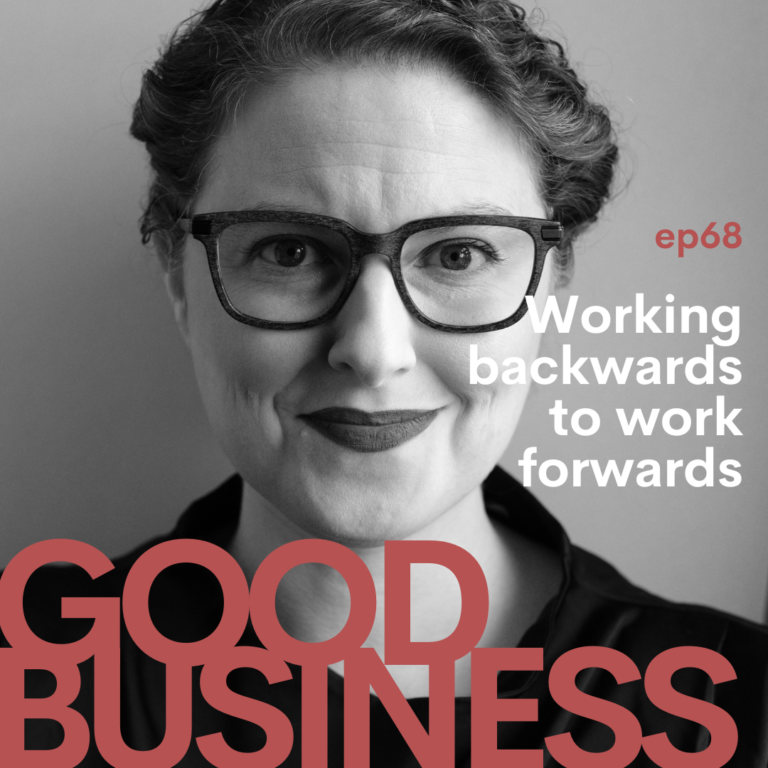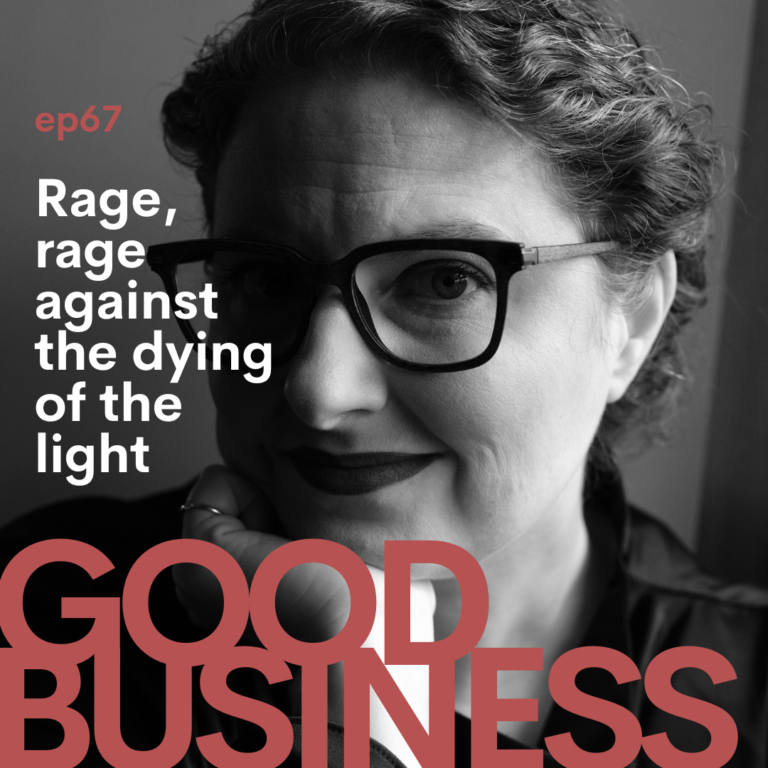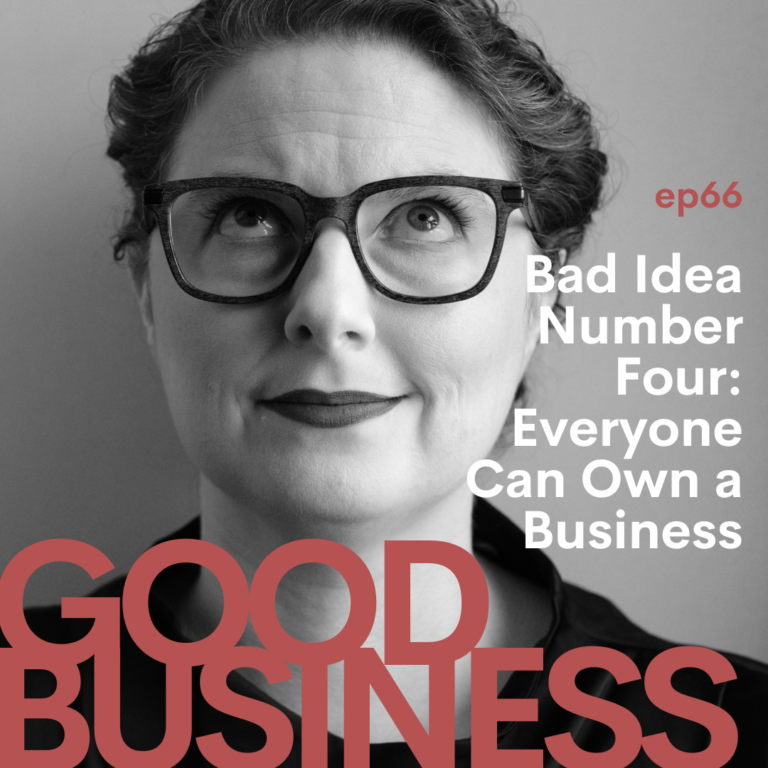This episode is all about what it feels like to lead with power. This might seem like a bit of a misnomer. Obviously, if you’re going to lead, then you have to have power, right? Well, it’s not actually true. This week, I talk about powerless leadership and what it looks like, the kind of power you want for effective leadership, and what it feels like to lead with (or without) power.
Do you want to know what you have, what you are capable of, and what makes you effective? Join me for this episode on leading with power.
Episode Transcript:
Welcome back to the Good Business Podcast, I’m Illana Burk, and I’m so delighted you’re here with me today. On last week’s episode, we talked about the idea of getting comfortable with power. Today, we’re going to bridge off of that topic. And we’re going to talk about what does it feel like to lead with power?
Now kind of sounds like a little bit of a misnomer, right? I mean, obviously, if you’re going to lead, then you have to have power, right? It’s not actually true.
Powerless leadership is anemic. Right. It’s the lame-duck president. It’s the business owner who doesn’t understand that they have to acquire power before they start selling something.
It’s the coach who doesn’t have the respect of her players.
That’s what powerless leadership looks like. It ends up looking like authoritarianism a lot of the time. Sometimes authoritarianism can have plenty of power and lots of tyranny baked in, but it can also be someone who perhaps rose to their level of incompetence, where they are responsible for leading, but they don’t actually have power. Because here power is sort of synonymous with credibility and trust.
Those are pieces of good usable power.
Credibility. Trust. Understanding. Empathy. Attention. Willingness to make changes based on the needs of your flock. That’s real power.
What does it feel like, as a business owner, or a leader or an entrepreneur, if you work for somebody, this applies too. What does it feel like to lead when you have power? Well, it feels different, and many of you probably have never really experienced it, because you don’t know the difference. If you still don’t know the difference, definitely listen to episode 38 that we did last week, ‘cause we talked a lot about that.
The short version is, the acquisition of power is such a baseline necessity for effective leadership, that you really can’t do one without the other. Not effectively and not long-term.
Now the kind of power that you’re looking for, in order to be an effective leader, has to come from responsibility and values.
You got to know what your values are. You have to be willing to stand up for them, even when it’s inconvenient.
And you have to be willing to make changes to the way that you operate in order to lean into what gives you more or less power. You have to understand you know, when I do this, I get more power. When I do this, I get less power. Meaning, functionally when I do this, more people like what I have to say, and when I do this, less people like when I have to say. It can really be that simple.
So, what does it feel like to lead with power? Well, first let’s talk about what it feels like to lead without power.
It feels like pushing a boulder up a hill.
It feels like everything is harder than it should be.
It feels like other people have something inherent figured out that you just haven’t figured out.
It feels like, people who have gained success and just seem to make it look so easy, but you can’t figure out what you’re doing wrong.
It looks like effort. Leading without power feels like effort. It’s hard. Really really hard.
It’s every time you try to sell something and nobody buys it.
It’s every time you put out content and nobody listens, no matter how good it is.
That’s what powerless leadership looks like. You can absolutely lead without power. You just won’t get very far very quickly.
So, how do you, what does it feel like to lead with power?
Leading with power feels like effectiveness. It feels like progress. It feels like it’s regenerative. Meaning when you do something, you put something out, the act of doing it instead of feeling like effort feels like it’s actually growing more power for you. You release a product and it sells well, and it actually feels like it’s growing your creativity and stature by selling something versus using up equity to sell something.
When you figure it out, what kind of power you need to have to be effective, then you get to feel this resonant sense of calm, honestly, in what you get to do. Now that requires, again, a lot of responsibility. You have to get what you have. By get, I mean, understand. You have to understand what you have. You have to know what you can do with it. You have to know its limits too. You gotta be really realistic about the limits of leading with power.
You have to know how much power you’ve actually acquired and what’s possible with it. You know, a little bit of power can do a little bit of change. A lot of power can do a lot of change.
So, what kind of power are you looking to acquire? The kind that comes from the attention of others? The kind that comes from money? A little bit of both, maybe? The kind that comes from righteousness? And I mean that in a positive sense, not like the “you’re so self-righteous way,” but like a general, like I’m on the, the right side of history, righteousness.
Does it come from victimhood? There is power in being a victim. Yes, there is. A lot of us lean into it. That’s what martyrdom looks like. Not saying that’s a good thing. I’m just saying it is. You got to know where your power center is. Where are you getting it? And how are you fanning the flames of it?
When you think about where your power comes from, small as it may be, what is it? Where does it come from? How do you cultivate it? How do you fan the flames of it? Did it happen upon you by accident? Did it come because your skin is white?
How do you know where your power comes from? Do you know what your liabilities are that take your power away? Can you get real about that? Can you recognize that what might be a liability to your acquisition of power in one context might be an asset in another? Meaning, there’s forums where being a woman can be a huge advantage and a huge power grab.
And then there’s other forums where being a woman can devalue your ability to make any difference at all. That’s what I mean by that. How do you know the different levels of power that you have, or don’t have, based on the context of where you stand? Metaphorically or actually.
Start paying attention.
Knowing what you can do, knowing what you have, and knowing what you can do with it, is what makes you effective. It’s what makes you efficient. It’s what makes you stop banging your head against a wall, because you actually understand what you’re capable of.
All right, everybody. We’re going to talk more about power in the next episode. I hope you join us. Have a great day.
More Episodes
GB68: Working backwards to work forwards
Welcome back to the Good Business Podcast. I'm your host, Illana Burk. Today, we're diving into one of my favorite productivity tools, which, amusingly enough, isn't really a productivity tool at all. As a business coach,...
GB67: Rage, rage against the dying of the light
Welcome back to the Good Business Podcast. Today, we're talking about visibility. It's a big theme for me at the moment, as this week marks the start of "Go for the Know," my very new, very exciting, totally free program for...
Bad Idea Number Four: Everyone Can Own a Business | GB66
In this episode, I debunk the myth that everyone should own a business. Entrepreneurship requires a high tolerance for risk and can deeply affect personal relationships. Success in business isn't just about skills, but about...
Why we need to put our best stuff out for free | GB65
In this episode, we talk about why it is the right thing to do to give out your work, your very best work, generously, and everywhere you can, why special and generous content wins, the pitfalls of marketing funnels, and how...
How to give feedback | GB64
In this episode, we’re tackling the often-dreaded task of giving feedback. We all know how important feedback is for growth, but delivering it in a constructive and respectful way can be a challenge.
Join us as we explore the art of giving feedback without being a jerk. We’ll discuss why feelings matter in business, the four key steps to giving effective feedback, and how to approach difficult feedback with empathy and honesty.
How to ask for and take feedback | GB63
Navigating feedback can be daunting. In this episode, we dive into the skills of asking for and receiving feedback with intention and grace. Learn the art of crafting your asks to elicit constructive insights and how to...






